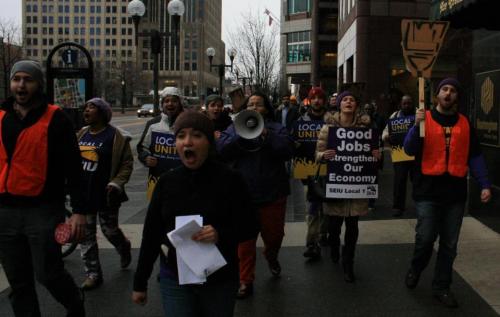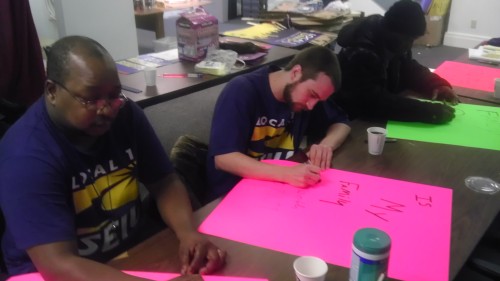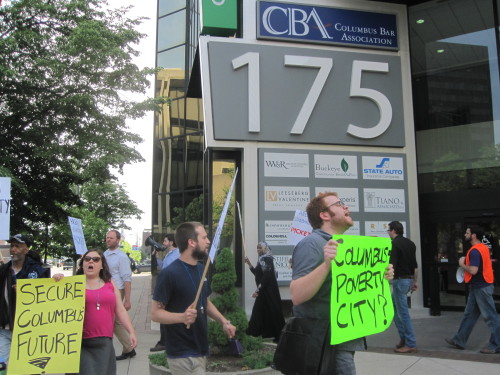#unions
Esmeralda Perez knows that keeping buildings clean isn’t easy. The mother of three has worked as a janitor at Chase Bank’s offices in Polaris for the past seven years, and before that, she worked as a housekeeper.
Her day begins at 5:30 pm and ends at 2 am, long after the office workers have gone to sleep. Each day she cleans bathrooms with hazardous chemicals that require her to wear a mask, goggles and gloves.
To make matters worse, if one of her coworkers misses work, Esmeralda’s workload increases – with no extra time allotted to compensate for it. No matter how much cleaning there is to be done, she and her coworkers only get 8 hours, plus a half-hour meal break. The resulting workload puts significant strain on Esmeralda’s back, and there are days she can barely work through the pain.
Esmeralda estimates that over 40% of her income goes toward paying rent, with much of the rest of her income spent on essentials for her children., Her employer, Mid-American Cleaning, does not provide family health insurance, so her five-year-old daughter qualifies for Medicaid, but supporting her is still a struggle as she grows. Her oldest child is trying to start college, too, making her finances even tighter as she tries to help him get an education.
Corporations in the area are prospering – JP Morgan Chase paid its CEO $23 million in 2011, and eleven Fortune 1000 CEOs headquartered in Columbus took home over $134 million in pay. Unfortunately, while Columbus’s unemployment rate remains well below the national average, the poverty rate in our city has nearlydoubled in the past 10 years. This is because more and more jobs in our city don’t pay a living wage. In a city home to hundreds of millions of dollars in profits each year, most full-time janitors are paid less than $19,000 annually, meaning that many qualify for government assistance.
Esmeralda has hope, both for herself and for her coworkers. She knows that raising standards will help everyone – and will also help secure a better future for her children.
Post link
Five days a week, Veronica Ramos-Lopez rides with her coworkers to work as a janitor at Chase Bank’s Polaris offices. She works from 5:30 p.m. until 2 a.m. most nights, cleaning bathroom after bathroom with an arsenal of cleaning chemicals. It’s hard work that doesn’t even offer sick days, meaning that Veronica often has no choice but to work while sick if she falls ill.
Despite hard work from Veronica and her coworkers at Mid-American Cleaning, if another janitor is absent, everyone else’s workload increases – with no extra time allowed to complete it. This not only makes the work harder, but also affects the quality of work janitors are able to perform. Veronica is grateful that she hasn’t had an injury on the job yet, but wonders if it may only be a matter of time.
Veronica’s story is too common among working people in Columbus. Columbus janitors are among the thousands of working people in our city who can work full time and still qualify for public assistance. Despite the city’s wealth, janitors are paid only $10 per hour, meaning that most full-time janitors receive less than $19,000 each year – well below the poverty level for a family of three.
This stands in stark contrast with the city’s Fortune 1000 CEOs whose offices the janitors clean: in 2011, eleven Fortune 1000 CEOs headquartered in Columbus took home a combined $134 million in pay. In an economy as healthy as Columbus’s, there is no excuse for poverty to exist among hard-working families.
The injustice evident here is not lost on Veronica, who lives with some of her coworkers in an attempt to make ends meet. She has an eight-year-old daughter who qualifies for Medicaid and a nineteen-year-old son who works in a factory nearby because he can’t afford to go to college.
With the janitors’ contract now being renegotiated, Veronica knows that if she and her coworkers do not receive raises as they have in the past, paying for rent and the increased cost of groceries will be next to impossible. Already, her rent and bills take up about half of her paycheck, leaving little for groceries and clothing for her growing son and daughter. Her dream of sending her children to college may be out of reach if corporate leaders don’t stand up for family-sustaining wages across Columbus.
Post link
Like all mothers, Adilo Muse adores her four children, who range in age from one to five years old. The oldest has just started school, and the youngest loves to play with his brothers.
But Adilo is struggling to have her youngest son’s medical needs taken care of, since he has asthma and sometimes requires a breathing shield. To make matters worse, the doctor says he will likely require surgery for a small lump in his throat. Adilo’s family likely qualifies for Medicaid, and she is in the process of applying for it.
Adilo isn’t unemployed, though – she works as a janitor at the Lazarus Building downtown. Despite working for cleaning contractor Professional Maintenance for four years, she is stuck at part-time status, working just 20 hours a week. She has searched for other jobs with no success.
Between what she makes and what her husband makes at temporary jobs, “the money is not enough,” she says. They manage to make ends meet in their small apartment on the West Side only through the help of family members.
“My mom is also sick,” she says, “but I don’t have enough money for daycare.” So if her husband is working, her mom has to watch the children when Adilo goes to work.
Despite this, Adilo wants more hours – because if she was full-time, she would qualify for health care and vacation days. With no sick days and a “four-strike” point system that can get her fired if she misses work, she can’t afford to take days off to care for her children or for herself.
Columbus needs family-sustaining wages and benefits, and the corporations here can afford to support those. Eleven Fortune 1000 CEOs headquartered here took home $134 million in pay in 2011, and 2012 was a banner year for corporations rebounding from the recession. On the other hand, most Ohioans make less today than they did in 1979 – meaning that while corporate profits have increased, working families’ wages haven’t kept pace with rising costs of food, rent and utilities.
Like many of her coworkers, Adilo wants to see things improve, both for her sake and for her children’s sake. She wants to see them go to college, but she knows that unless something changes, they will not be able to afford it.
Post link
Columbus janitors and their allies rally downtown on Monday, January 28, asking the Columbus business community to support living wages and benefits for working families!
You can sign our petition here to get updates on the janitors’ fight!
(EDIT: Link has been changed from the original email link. Thanks for all the emails you wrote to cleaning contractors!)
Post link
Columbus janitors make signs for today’s rally! As they prepare to make a stand for living wages, will you support them by signing our petition and staying in the loop on their fight?
(EDIT: Link has been changed from the original email link. Thanks for all the emails you wrote to cleaning contractors!)
Post link
In case you missed it: Columbus janitors and community supporters held an area standards picket outside 175 S. Third Street, where employees of Circle Building Services are paid poverty wages and have no access to affordable health care.
Post link
Check out the new video!
Unemployment in Columbus is decreasing while poverty continues to rise. This is because more and more jobs do not pay a living wage.
Columbus service workers are coming together to change this. Janitors – who have now been without a contract for three months – are standing up for justice alongside security officers who protect our downtown buildings, and are organizing to bring good jobs to their communities.






